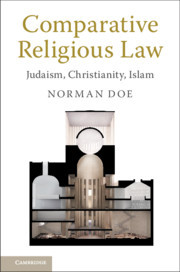Description
Comparative Religious Law
Judaism, Christianity, Islam
Author: Doe Norman
Compares the modern legal instruments of Jewish, Christian and Muslim organisations in light of their historical religious laws.
Language: English
Subject for Comparative Religious Law:
Comparative Religious Law
Publication date: 11-2018
468 p. · 15.3x22.7 cm · Paperback
Publication date: 11-2018
468 p. · 15.3x22.7 cm · Paperback
Approximative price 107.81 €
In Print (Delivery period: 14 days).
Add to cart
Comparative Religious Law
Publication date: 11-2018
468 p. · 15.7x23.5 cm · Hardback
Publication date: 11-2018
468 p. · 15.7x23.5 cm · Hardback
Description
/li>Contents
/li>Biography
/li>
Comparative Religious Law provides for the first time a study of the regulatory instruments of Jewish, Christian and Muslim religious organisations in Britain in light of their historical religious laws. Norman Doe questions assumptions about the pervasiveness, character and scope of religious laws, from the view that they are not or should not be recognised by civil law, to the idea that there may be a fundamental incompatibility between religious and civil law. It proposes that religious laws pervade society, are recognised by civil law, have both a religious and temporal character, and regulate wide areas of believers' lives. Subjects include sources of law, faith leaders, governance, worship and education, rites of passage, divorce and children, and religion-State relations. A Charter of 'the principles of religious law' common to all three Abrahamic faiths is proposed, to stimulate greater mutual understanding between religion and society and between the three faiths themselves.
Preface; Table of abbreviations; Introduction; 1. The laws: communities, sources and functions; 2. The faithful: status, duties and rights; 3. The faith leaders: appointment and functions: 4. The governance of communities: institutions and officers; 5. The resolution of disputes: courts and tribunals; 6. The faith, worship and education; 7. The rites of passage; 8. The family, marriage and children; 9. The property and finance of the faith community; 10. The religion, state and society; Conclusion; Appendix: toward a charter of Abrahamic law; Bibliography: primary sources 1. Jewish materials; 2. Christian materials; 3. Islamic materials; 4. The law of the state: parliamentary legislation, secondary legislation, judicial decisions, charity commission; Secondary sources; Index.
Norman Doe is a professor at Cardiff University Law School. He studied at Cardiff University, the University of Cambridge, and the University of Oxford, and is a barrister. His degrees include a Ph.D. (Cambridge), D.CL. (Lambeth) and LL.D. (Cambridge). His books include Fundamental Authority in Late Medieval English Law (Cambridge, 1991), Canon Law in the Anglican Communion (1998), Law and Religion in Europe (2011), and Christian Law (Cambridge, 2013). A visiting professor at Paris University and the Katholieke Universiteit Leuven, he was a visiting fellow at Trinity College, Oxford (2011), visiting scholar at Corpus Christi College, Oxford (2015), and visiting fellow at Jesus College, Oxford (2018) and acted as a consultant on canon law to the Anglican Communion, served on the Lambeth Commission (2003–04), and is Chancellor of the Diocese of Bangor. He is director of the LL.M. in Canon Law at Cardiff University.
© 2024 LAVOISIER S.A.S.




